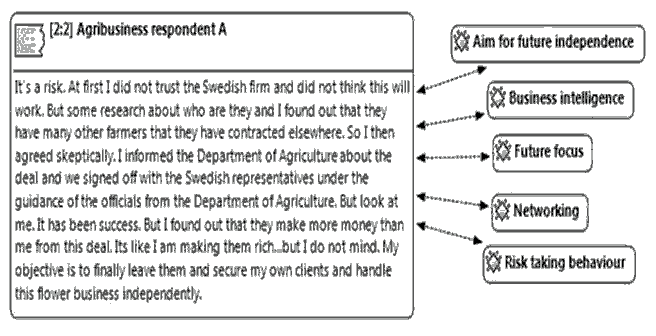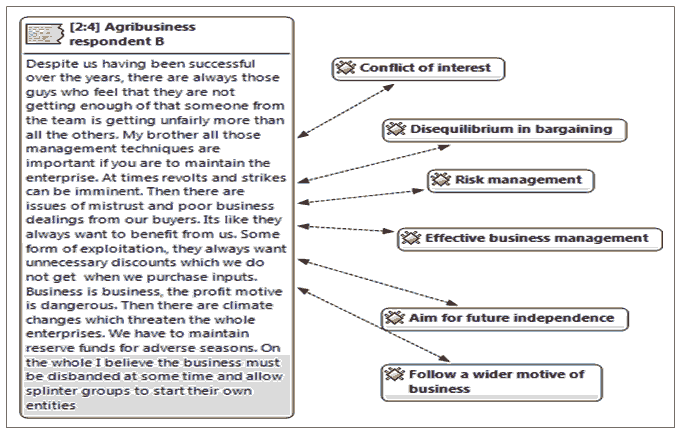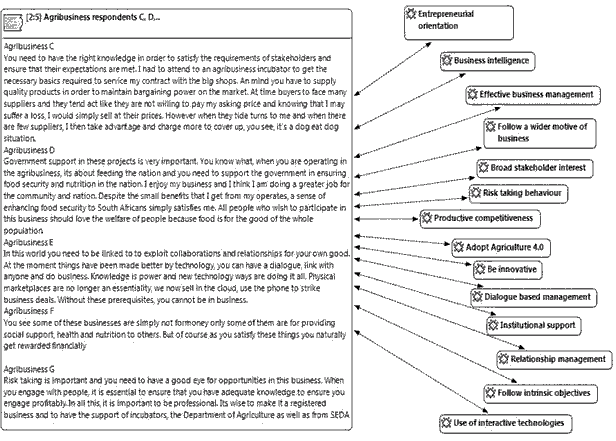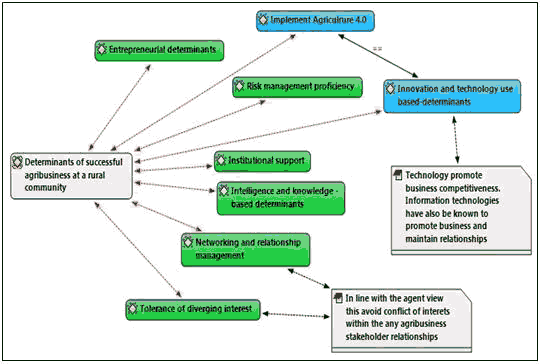Research Article: 2021 Vol: 20 Issue: 6S
An Agentic View of the Determinants of Successful Agribusinesses at a Rural Community in the Eastern Cape Province of South Africa
Samson Nambei Asoba, Walter Sisulu University
Nteboheng Patricia Mefi, Walter Sisulu University
Abstract
The study was based on the need to inform the fundamentals of successful agribusinesses in rural communities. This was found to be important following observations that emerging economies have a greater part of the population relying on agrarian activities. In respect of the above premises, this start investigated the determinants of success agribusinesses at a rural community following the agentic view of phenomena. The methodology adopted was based on a followed the constructive paradigm based on the thematic analysis of responses provided to an open ended questionnaire. The open ended questionnaire required participants to provide a narration of how they have succeeded in running their agribusiness enterprises of the years. The study found that require strong entrepreneurial traits and skills, good management skills as well as value their contribution to community welfare so that they are able to manage conflict relations that may be part of agribusiness operations. The study also found evidence in support of literature perspectives for the strong need for technological adoption and digitalisation of their enterprises. Following this study, it is recommended that agribusiness entrepreneurs should enhance an intrinsic value for society’s welfare so that they can be able to deal with conflict situations in line with the agentic view.
Keywords
Agribusiness, Entrepreneurship, Competitiveness, Agro-Enterprises
Introduction
With a high rate of unemployment and a relatively low rate of entrepreneurship in South Africa particularly in rural communities, agribusinesses remains a key alternative to sustainable economic inclusion. In African countries like Africa, the question of land and agricultural economic exploitation is a critical political issue related to food sovereighty (Altieri, 2009). In the same way, Rambe & Khaola (2021) posit that emerging economies such as South Africa rely on agrarian activities to foster development and alleviation of poverty especially in rural communities. Against such a background there is significant need to explore the requirements for successful agribusiness especially with respect to rural communities. The need to strengthen agribusinesses is also critical in enhancing the Millennium Development Goals for Sustainable Development as enunciated within the United Nations framework (Hinson, Lensink & Mueller, 2019). This study explores the determinants for success agribusiness in a selected rural community following the lens of the agency theory. Agency theories offers an important perspective for this analysis as it recognizes the nature of agribusinesses in terms of a network of relationships involving various players who could be acting within agent relationships.
Literature and Theoretical Framework
The Agency Theory
This study used the agency theory to as a lens to study the determinants of successful agribusinesses in a rural province of South Africa, the Eastern Cape. This theory views entities within contract relations (Marks-Bielska & Zieli?ska, 2018). Bendickson, Muldoon, Liguori & Davis (2016) reveals that agency can be traced back to the prominent work of management theorist, Adam Smith, who referred to it describing the nature of the relationship between shareholders and those who manage their companies. The key tenant of the agency theory is that the agency relationship is based on principals and their agency who are engaged in some form of relationship or interaction. Bendickson, et al., (2016) speculates that the principal-agency relationship is basically shaped by the need to share certain risks which the principal cannot absorb alone. In order to decimate the risks the principal bestows certain responsibilities to an agency and then expect the agency to act on behalf of the principal. Within this theory, the principal faces the problem associated with failure of an agency to strongly represent the interest of the principal thereby creating agency costs which are borne by the principal but in many circumstances the principal has the right to terminate the principal-agency relationship. The other problem espoused by the agents theory relate to the equilibrium and disequilibrium problem which explains that when the agent perceive fair and equitability in the principal-agency relationship then the agency is likely to act for the interest of principals but if the agents perceives disequilibrium in favour of the principal then the agency may engage in self-fulfilling behavior. Panda & Leepsa (2017) sums these problems as, (1) conflict of interest and (2) agents cost which arises from variation in ownership and control. Research in the agents theory has followed the principal-agent problems of risk sharing and agent monitoring while positivist agency theory research has focused on the ways in which agent self-serving behavior can be managed. Agency theory is therefore a powerful model that is linked to and has informed significant work in economic and management. The work of Fayol, Weber and Marx can all has links with the agency theory.
Agribusiness
Agribusiness is a term that emanates from the combining of the terms ‘agriculture’ and ‘business.’ The term denotes involvement in profitable combinations of forces of food production, marketing, administration and management (Ibrahim & Wang, 2016:6). Global dynamics in the agriculture sector has meant that what was traditionally called agriculture is now called agribusiness in contemporary times (King, Boehlje, Cook & Sonka, 2010). Research in agribusiness has significantly grown over the years following two main themes, agribusiness economics and agribusiness management or administration (King, et al., 2010). In many African economies food production, security and nutrition remain a key political component. This is especially so in relation to the production of stable food products in poor and rural communities. As a result most African government have often found it necessary to get involved in food production in their nations. This study was formulated to explore the determinants for successful agribusiness in the rural environment. It therefore, was oriented to the study of agribusiness economics which considers Agribusiness the ways in which institutions, structures, organizations markets impact on vertical and horizontal coordination within the food system (King, et al., 2010). A number of strategies exist for boosting agribusinesses including cooperatives, integrations and contract arrangements. Contract agribusiness arrangements have been found to be effective in dealing with issues such as market failures, strengthening and accelerating technological use in agribusiness (Ragasa, Lambrecht & Kufoalor, 2017). This is achieved through addressing issues in the agribusiness value chain which include marketing, input supply, production and processing (Simmons, 2007)
Agency Theory and Agribusiness
As observed in the work of Arcas-Lario, Martin-Ugedo & Minguez-Vera (2014), the agentic view is relevant to the study of agribusinesses given that such enterprises usually involve many stakeholders in different forms of relationships. These stakeholders include owners, buyers, sellers and controllers. There is high likelihood for conflict of interest and systems of agents cost that are likely to dominate the relationships among these stakeholders. Marks- Bielska & Zieli?ska (2018) investigated the application of the agency theory in farm leasing arrangements where the farmer is contracted to use land for a particular arrangements. Farming business often involve several arrangements which reflect principal-agent relationships such as contract farming arrangements, cooperatives or agri-enterprises which usually take the form of entrepreneurial ventures in agribusiness opportunities. Rudiments of the agentic theory in agri- business arrangements include the likelihood of conflict of interest among players in agri- enterprises as well as the agent’s costs existing in agribusiness enterprise relationships. Give these arguments, if agribusinesses are to be strengthened to increase their survival rate as well as offer critical forms of employment to agri-entrepreneurs then there is need to explore how agent conflict and agent cost can be minimized.
Purpose of the Study
In recognition of the application of the application of the agent theory in agribusiness settings, this study aimed to explore the determinants of success agribusiness arrangements from the view of agents theory with specific focus of the management of agent conflict as well as interest.
Methodology
The study was aligned to the qualitative research design which is inductive and interpretive. Qualitative researchers highlight that qualitative methodologies are capable of providing in-depth and context relevant data relative to objective methodologies (Creswell, Hanson, Plano & Morales, 2007). The ontological position of the present study was that reality is inherent in the opinions, beliefs, perceptions and values of people. Therefore knowledge of reality is likely to be established by interacting and engaging respondents involved in agribusiness. The choice for qualitative research in the social sciences is mainly based on its capacity to provide detailed and in-depth information about complex phenomena (Kivunja & Kuyini, 2017). By being interactive and its orientation to the real expressions of people in their natural settings, qualitative research tends to be humane. It also provides vast and broad dimensions of data that offers significant insights to research questions. In many social studies, qualitative research approaches tend to be the best in yielding desired information). This study adopted convenience sampling in line with qualitative research. The sampling frame involved a farming community in the Eastern Cape Province and the population was the farmers in the selected farming community. Respondents were selected based on convenience and willingness to participate in the study. Of the thirty (15) agribusiness people who had plots in the irrigation scheme, six (6) of them were willing to participate in the study. The researcher was introduced to the farmers by the community leaders of the community. This was done on one of the community meetings held at the community. The purpose of the study was communicated and participants who were willing to participate in the study were identified. A questionnaire with open ended questions was used as the main data collection instrument used. The respondents were simply required to provide a narrative of their agribusiness with specific reference to their relationship with other interested stakeholders to their business in line with the agentic theory The questionnaire items were established based on the research questions. Table 1 below provides demographical details of the respondents
| Table 1 Demographical Details of Respondents |
||
|---|---|---|
| Nature or Agribusiness | Years in the business | |
| Agribusiness A | Horticulture. Contracted by a Swedish firm to produce certain flowers which are best produced in the rural climate of the Eastern Cape. Under the arrangements, the Swedish firm provide all non-labour resources and the farmer provides the labour. | 4 years |
| Agribusiness B | Grows maize as part of a small enterprise employing 20 people and they operate a small Miller where proceeds from the farm are later taken for milling to produce maize which is later sold to locals as well as small spaza shops around the area | 5 years,, |
| Agribusiness C | Was part of a cooperative vegetable scheme growing various vegetables including tomatoes, spinach, onions, and carrots. The cooperate is an initiative of the Shoprite group which provided seed capital and now require all produce to be sold to it under subsidized prices | 3 years |
| Agribusiness D | Operate a family agribusiness after securing a loan from the Department of Agriculture the terms of which are to return the loan with 20% interest once off after 3 years with strict government monitoring to ensure incremental growth of the project so that at the end of the five years it should be able to cover the loan. | 2 years |
| Agribusiness E | Is an intermediary with a network of big vegetable shops and a database of farmers from which he buys farm produce for supply to the shop network | 2 years |
| Agribusiness F | Operate a government supported health food farming program under a contract. The contract involves the growing of classified health farm outputs for patients with certain ailments in hospitals and related health and fitness community projects | 6 years |
| Agribusiness G | Is a partnership involved in the buying and selling of farm projects. The products are bought straight from the farms for selling a certain distant areas where they are often not readily available | 8 years |
Results and Discussion
Data collected was analysed using thematic techniques which started by the creation of both in-vivo and open codes for the data provided by the respondents. As suggested by prominent grounded theorists Glaser & Strauss (1967), qualitative data analysis is an iterative process that involves data reduction nd aspects of theoretical sampling to create meaning from data collected. Figure 1 provides the codes created in the thematic analysis of the responses from Agribusiness respondent A.
From the responses, four codes were created as shown. The narration demonstrated that the agribusiness entrepreneur aspires to be independent in future. There was also indication that the agribusiness required elements of knowledge and business intelligence to be successful. In relation to agent conflict, the respondent suggested that he adopts a future focus and risk taking approach in ensuring that conflict with others is minimised. The responses provided by Agribusiness B are shown in Figure 2.
Figure 2: Narrations of Agribusiness Respondent B on the Nature of Her Relationship With Stakeholders
The responses of Agribusiness respondent B provided further themes in the way the agribusiness entrepreneur manages relationship with stakeholders. The entrepreneur accepted the existed of conflict, disequilibrium in bargaining, the need for risk management, effective business management; need to aim future independence as well as following a wider motive of business. The agribusiness respondent shows the codes represent some of the ways in which conflict with stakeholders can be minimised. The coding for the responses of the other agribusiness respondents is provided in Figure 3
A number of codes were also provided. New codes such as the need for effective dialogue, the need to have wider business objectives, institutional support, following intrinsic business objectives, effective relationship management and the use of interactive technologies were indicated. Other important codes that emerged included the adoption of Agriculture 4.0 practices, having broader interest of business stakeholders and being innovative. These codes were then clustered into groups which are shown in Figure 4.
The results of this study have provided results which are significant in providing the determinants of successful agribusiness practices from the view of the Agents theory. The agents theory appears to be a powerful lens for looking at the nature of agribusiness, its stakeholders and agro-entrepreneurs. It appears that agribusiness really presents an interesting business opportunity for entrepreneurs. The results indicate that the various traits of an entrepreneur seem important for successful agribusiness. The results also suggest that there is need for risk management proficiency among agribusiness players including the need for proper intelligence and knowledge of agribusiness. These results increase the strength of some related studies in the literature such as those of Ibrahim & Wang (2016). In respect of the conflict of interest dimension of the agency theory, the study suggest that there is need for the agribusiness entrepreneur to be tolerant of relationships and diverging views consistent with principal-agent relationships. This essentially calls for agribusiness entrepreneurs to hold broad interest in satisfying community welfare needs. Agribusiness entrepreneurs need to value their contribution to the community and think beyond the present in order to be able to handle principal-agent conflicts. This results should be seen as complementary to recent studies in agribusiness which advocate for innovativeness and the adoption f recent technologies for successful agribusiness (Knierim, Kernecker, Erdle, Kraus, Borges & Wurbs, 2019; Rambe & Khaola, 2021).
Conclusion
This study has informed on the determinants of successful agribusiness practices from the perspective of agent’s theory. The study principally suggests that agribusiness entrepreneurs need to possess appropriate entrepreneurial skills and require institutional support to engage in agribusiness success. It has also been established that the management of conflict relations in agribusinesses as seen within agent theory require that agribusiness entrepreneurs be intrinsically driven to satisfy broad community needs. Agribusiness entrepreneurs need to value their contribution to community welfare so that they are able to manage conflict relations that may be part of agribusiness operations.
Recommendations
Following this study, it is recommended that agribusiness entrepreneurs strengthen their entrepreneurial capacities through attending support programmes such as registering in small business incubation and also linking up with the Small Enterprise Development Agency (SEDA). The study recommends that the development of entrepreneurs include grooming them to have broad appreciation of their role in community welfare. This is essential in improving their conflict resolution as they relate to many stakeholders in their enterprises. The adoption of innovative technology is also recommended for agribusiness entrepreneurs to remain viable and competitive.
References
- Arcas-Lario, N., Martin-Ugedo, J.F., & Minguez-Vera, A. (2014). Farmers' satisfaction with fresh fruit and vegetable marketing spanish cooperatives: An explanation from the agency theory. International Food and Agribusiness Management Review, 17(1), 127-146.
- Altieri, M. (2009). Agroecology, small farms and food sovereignty.
- Bendickson, J., Muldoon, J., Liguori, E.W., & Davis, P.E. (2016). Agency theory: background and epistemology. Journal of Management History, 22(4), 437-449.
- Chrisnall, P.M. (1991). Essence of Marketing Research. (1st Edition). New York: Simon & Schuster.
- Creswell, J.W., Hanson, W.E., Plano, V.L.C., & Morales, A. (2007). Qualitative research designs: Selection and implementation. The counselling psychologist, 35(2), 232-264.
- Hinson, R., Lensink, R., & Mueller, A. (2019).Transforming agribusiness in developing countries: SDGs and the role of FinTech. Current Opinion in Environmental Sustainability, 41, 1-9.
- Ibrahim, M.H., Wang, Z.Z. (2016). The rise of agri-business enterprises desire towards market shares and the need for global strategic marketing management. Journal of Glob Econ omics, 4(3), 3-9.
- Kahneman, D. (2003). Maps of bounded rationality: Psychology for behavioural economics. American economic review, 93(5), 1449-1475.
- King, R.P., Boehlje, M., Cook, M.L. & Sonka, S.T. (2010). Agribusiness economics and management. American Journal of Agriculture Economics, 92(2), 554-570.
- Kivunja, C., & Kuyini, A.B. (2017). Understanding and applying research paradigms in educational contexts. International Journal of Higher Education, 6(5), 26-41.
- Marks-Bielska, R., & Zieli?ska, A. (2018). Leasing of agricultural land versus agency theory: the case of Poland. Ekonomia i Prawo. Ecomomics and Law, 11(1), 83–102.
- Marks-Bielska, R., & Zieli?ska, A. (2018). Leasing of agricultural land versus agency theory: the case of Poland. Ekonomia i Prawo. Ecomomics and Law, 11(1), 83–102.
- Panda, B., & Leepsa, N.M. (2017). Agency theory: Review of theory and evidency on problems and perspectives. Indian Journal of Corporate Governance, 10(1), 74-95.
- Ragasa.C., Lambrecht, I., & Kufoalor, D.S. (2017).Limitations of contract farming as a pro-poor strategy: The case of Maize Outgrower schemes in Upper West Ghana. World Development, 102(2018), 30–56.
- Rambe, P., & Khaola, P. (2021). The impact of innovation on agribusiness competitiveness: the mediating role of technology transfer and productivity. European Journal of Innovation Management, 1460-1060.
- Simmons, P. (2002). Overview of smallholder contact farming in developing countries. Agricultural and development economics division of the food and agricultural organization of the United Nations (FAO). Working Paper 02-04



